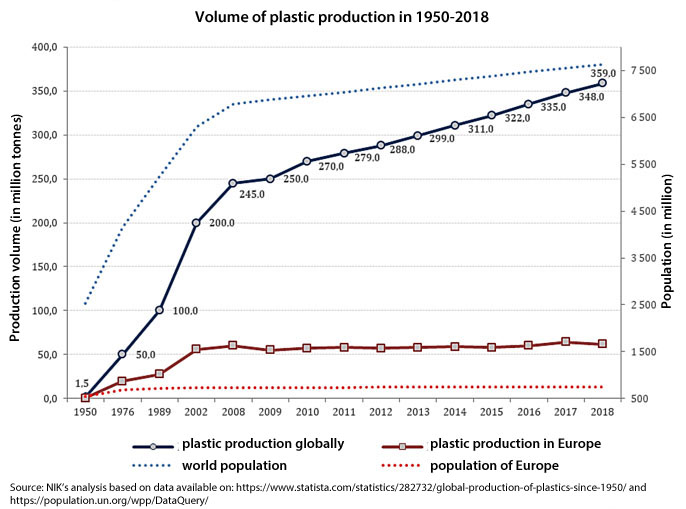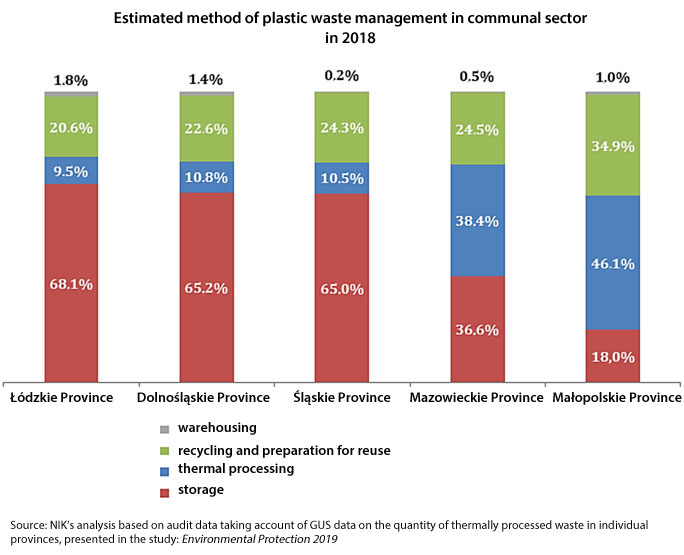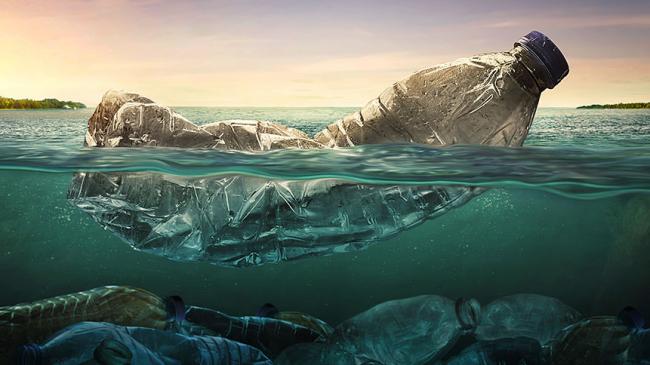NIK about efforts to reduce plastic waste
Chances are small that the circular economy model will be implemented in Poland in a short time. The slow rate of conceptual and legislative works of the Minister of Climate or the Minister of Development does not give prospects of their quick completion. Besides, the ministries do not have full knowledge of the issue as the data reporting system does not make it possible to establish the quantity of plastic waste or a satisfactory method of its disposal. There is no information campaign at the central or at the local level that would focus specifically on preventing waste generation.
The management of waste, especially plastic waste, is now one of the greatest environmental and economic challenges not only in Poland, but also globally. According to initial estimates, from 5 to nearly 14 million tonnes of plastic waste enters our oceans every year. Microplastics gathering in seas are easily swallowed by sea organisms. The latest observations also point to the presence of tiny particles of plastic (even below 1 micrometre) in the air, rainwater, drinking water and some foods. The effects of that phenomenon on human health have not been identified yet.

The European Union has been fighting with this phenomenon for many years now. Though, the EU gathers less than 30% of plastic waste for recycling purposes. A big part of that waste is sent outside the EU and is further processed in other countries where the environmental standards are often much different. At the same time, according to the report of July 2018 of the British equivalent of NIK, the National Audit Office (or NAO) and the data of the National Waste Management Chamber, after China put a ban on the import of some types of waste in 2018, Poland (as part of the EU), next to Malaysia, Turkey and Indonesia, became one of the key foreign markets to collect plastic packaging waste coming from Great Britain. Interestingly enough, Great Britain used to be one of the biggest plastic waste producers in the EU.
In view of the above, the Supreme Audit Office verified how the Polish state managed waste disposal from 2017 to 2019. The audit covered the Ministry of Climate and the Ministry of Development, five marshal offices and 15 municipal and communal offices. The audit also looked into activities taken before or after the audited period, if they were related to the execution of audit tasks.
Efforts taken by the Minister of Climate, and previously the Minister of Environment, and other audited public administration bodies were insufficient to reduce the generation of plastic waste or to manage it properly. Besides, the slow progress of conceptual and legislative works of the Minister of Climate or the Minister of Environment does not give hope for quick implementation of the circular economy model in Poland.
The Minister of Climate does not have reliable data about the plastic waste management. The NIK analysis reveals that the problems are much bigger than suggested by the available reporting data. Two separate systems, one developed by the Minister of Environment and the other applied by GUS (Central Statistical Office) were based on different calculation methodologies and presented different, incomparable data on communal waste. At the same time, NIK’s calculations and estimates showed that in 2018 in 3 of 5 audited provinces the key method of managing communal plastic waste was storage (65%-68% of generated waste). In the two remaining provinces the predominant method was thermal treatment of waste (38%-46%). However, in line with the effective hierarchy of waste handling, the highest-priority methods include recycling and preparation for reuse.

The slow progress of works on changes in waste management at the central level gives little hope that relevant ministries will implement any radical solutions in the nearest future. The Minister of Climate has not yet decided whether or not to implement the packaging deposits system (and if so, what it would look like), although the external expertise in that area was prepared already at the end of 2017. Besides, no mechanisms to support the packaging eco-design have been developed and the system of producers’ extended liability has not been streamlined. The Minister has not led yet to the adaptation of the EU Directive on the Packaging and Packaging Waste to the Polish legislation. Defining It is important for packaging manufacturers that the effective requirements are defined as soon as possible. The reason is they need time to prepare for the new solutions which will come into force by the end of 2024.
The Minister of Climate lacked detailed information on the market realities concerning the production of packagings and products in packagings or the possibility of their recycling. That was a huge barrier in designing and implementing new solutions in that area. NIK has pointed out that if the recycling level of plastic waste does not go up, it may mean that Poland will have to pay a tax in the future exceeding PLN 2 billion (to be introduced in the EU starting 2021).
NIK has positively evaluated development of the Roadmap towards the Transition to the Circular Economy. It needs to be underlined, though, that the great majority of measures specified in the Roadmap are concepts, guidelines or proposals of legal solutions . Therefore, even if the planned measures are fully implemented it will not stand for their automatic impact on the waste management improvement. Besides, in the course of this audit, most tasks being part of the Roadmap were still at their preparation stage.
The province marshals audited by NIK (with few exceptions) properly discharged their obligations related to verification and reporting in the area of waste disposal and running of databases. They also carried out periodic inspections in entities dealing with the management of packagings and packaging waste. NIK has pointed out, though, that there are no legal solutions to verify if the recycling fees for 2018 and 2019 were properly calculated. The relevant mechanisms will start to apply at the stage of settling fees for 2020. Besides, the effective regulations make it difficult for marshal offices to verify information about educational campaigns run by obliged entrepreneurs or to control the way of spending funds. Also, in case of campaign payments declared by entrepreneurs, they do not provide for the possibility of debt collection.
NIK’s analyses indicate that most of the audited communes usually used plastic waste management methods other than recycling or preparation for reuse. In 2017, in 13 communes such other methods made up from 55% to 95%, and in 2018 in 12 communes from 71% to 88%. However, from among 15 audited communes only two did not reach the level of recycling and preparation for reuse required for 2018, for four fractions of communal waste (paper, metal, glass and plastic). Though, it may not be stated that the plastic waste management methods adhered to the effective hierarchy of waste management methods. Besides, not all communes met their obligations defined in the National Waste Management Plan 2022 of 2016 or the National Programme for Preventing Waste Generation of 2014.
NIK has positively evaluated the education and information activities on waste management carried out at the central as well as local levels. The majority of those activities, though, dealt with waste segregation. NIK has pointed to the absence of an information campaign on preventing waste generation. This aspect is of the highest priority among waste handling methods.
Recommendations
To the Minister of Climate and Environment
- to speed up works on implementing solutions aimed at the transition to the circular economy in Poland mainly by:
- adopting standards for eco-design of plastic packagings,
- creating solutions to improve effectiveness of selective collection of communal waste, including plastic waste, and ensuring its management in a way consistent with the effective hierarchy,
- developing the system of extended liability of the producer who will ensure covering real costs of waste collection and management (including plastic waste),
- taking final decision on the implementation and assumptions of the packaging deposit system.
- to amend the Act on the Management of Packagings and Packaging Waste in a way enabling province marshals to carry out debt collection in case an entrepreneur bringing products in packagings to the market failed to pay for public educational campaigns or paid less than required.
To the Minister of Development, Labour and Technology
- to closely cooperate with the Minister of Climate and Environment to implement the circular economy model in Poland as soon as possible, with particular focus on plastic waste management.


